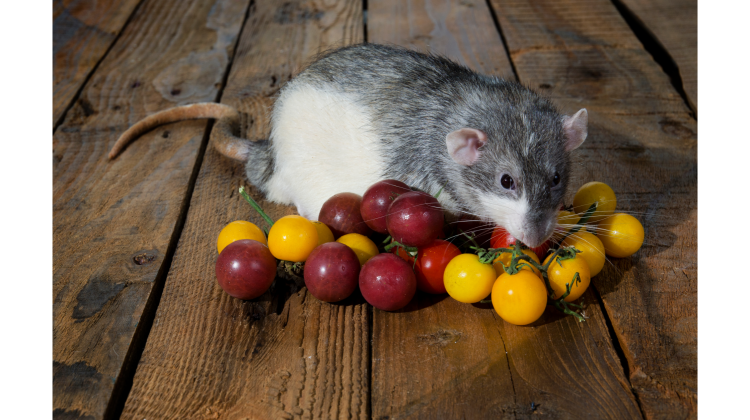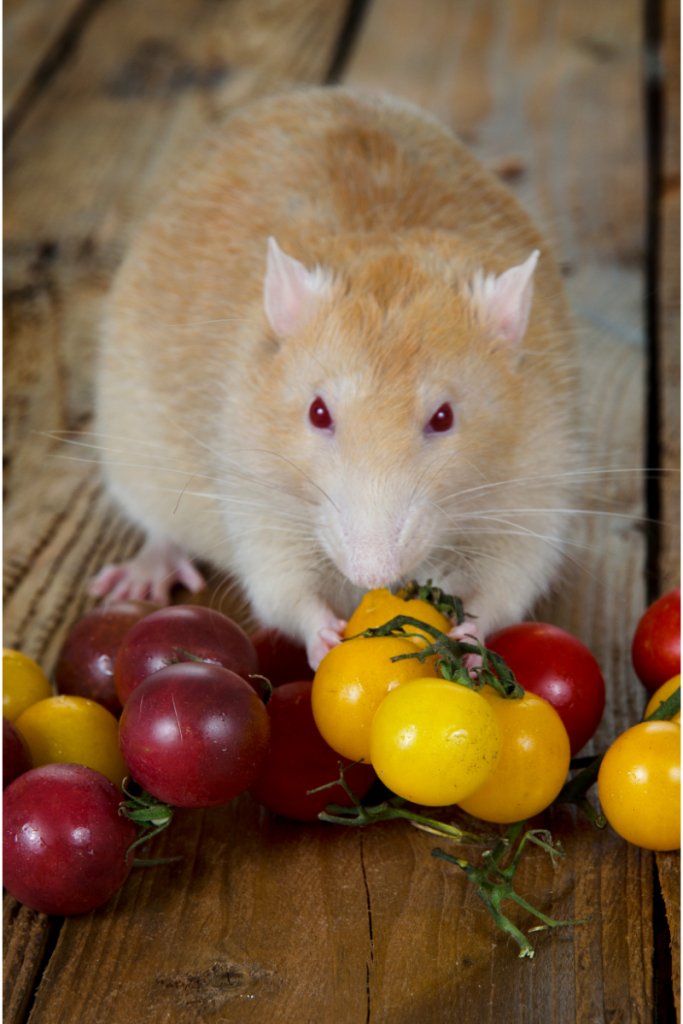
Can Rats Eat Tomatoes? Yes, rats can eat tomatoes, but only in moderation. Here are 5 surprising facts about rats and tomatoes that you shouldn’t miss.
Introducing tomatoes to a rat’s diet can provide them with essential vitamins, minerals, and antioxidants. However, it’s important to note that tomatoes should not be their primary source of nutrition as they are high in natural sugars, which can lead to weight gain and other health issues.
Additionally, some parts of the tomato, such as the stems and leaves, can be toxic to rats. Offering tomatoes as an occasional treat, in small quantities, is the best way to ensure a balanced diet for pet rats. By following these guidelines, you can safely incorporate tomatoes into your furry friend’s diet to provide them with both taste and nutritional benefits.
Contents
- 1 1. Rats And Tomatoes: An Unlikely Pairing
- 2 2. Nutritional Value Of Tomatoes For Rats
- 3 3. Potential Risks And Considerations
- 4 4. Health Benefits Of Feeding Tomatoes To Rats
- 5 5. Creative Ways To Incorporate Tomatoes Into Rat’S Diet
- 6 Frequently Asked Questions Of Can Rats Eat Tomatoes? 5 Surprising Facts You Shouldn’T Miss
- 7 Conclusion
1. Rats And Tomatoes: An Unlikely Pairing
Rats are known for their diverse diets, but can they indulge in tomatoes too? The answer might surprise you! While rats have their natural dietary preferences, they are also curious creatures when it comes to human food.
Contrary to popular belief, **rats can indeed eat tomatoes**. These fruiting plants offer a range of essential nutrients like vitamins A and C, potassium, and antioxidants. However, it’s essential to note that rats should consume tomatoes in moderation, as excess quantities can upset their stomachs due to their high acidity levels.
Aside from their nutritional value, **tomatoes can awaken a rat’s curiosity**. Their vibrant colors and juicy interior can attract these creatures to explore this unconventional food option. So, if you find a rat nibbling on a tomato in your garden, don’t be too surprised!
Remember, **tomatoes alone should not be a rat’s sole dietary source**. A balanced diet that includes a variety of foods ensures that rats receive all the necessary nutrients for their well-being. Always consult with a veterinarian or rodent expert for specific dietary recommendations and care for your pet rat.
2. Nutritional Value Of Tomatoes For Rats
Tomatoes are not only a tasty addition to your own diet, but they can also provide important nutrients for your pet rat. Let’s take a closer look at the nutritional profile of tomatoes and how these nutrients can benefit rats.
| Nutrient | Amount per 100g |
|---|---|
| Calories | 18 |
| Protein | 0.9g |
| Fat | 0.2g |
| Carbohydrates | 3.9g |
| Fiber | 1.2g |
| Vitamin C | 14mg |
| Vitamin A | 42μg |
| Potassium | 237mg |
Tomatoes are packed with essential vitamins and minerals that can support your rat’s overall health. They are a great source of vitamin C, which aids in immune function and helps protect against illness. Additionally, the vitamin A found in tomatoes is important for maintaining good vision and promoting healthy growth.
Furthermore, tomatoes provide potassium, which is essential for proper nerve function and muscle contractions. The fiber content in tomatoes can also support digestive health in rats.
It is important to note that while tomatoes can be a healthy addition to your rat’s diet, they should be served in moderation and as part of a balanced meal plan. Always consult with a veterinarian to ensure you are providing the best diet for your pet rat.

3. Potential Risks And Considerations
Potential Risks and Considerations:
Tomatoes are generally safe for rats to consume, but there are a few important considerations to keep in mind. Firstly, tomatoes contain certain toxic compounds such as solanine and glycoalkaloids, especially in the stems and leaves. While the levels of these compounds are generally low in ripe tomatoes, it is advisable to avoid feeding rats the green parts to minimize any potential risks.
Secondly, it is essential to take into account the quantity restrictions and recommended serving size for rats. While tomatoes provide valuable nutrients, they should be given as treats in moderation, as large quantities can lead to digestion problems or upset stomachs in rats. It is generally recommended to offer small slices or chunks of tomato as an occasional snack rather than a regular part of their diet.
| Risks and Considerations | Recommendations |
|---|---|
| Tomatoes contain toxic compounds such as solanine and glycoalkaloids, especially in the stems and leaves. | Avoid feeding rats the green parts of tomatoes. |
| Large quantities of tomatoes can lead to digestion problems or upset stomachs in rats. | Give small slices or chunks as an occasional snack. |
4. Health Benefits Of Feeding Tomatoes To Rats
The health benefits of feeding tomatoes to rats are truly remarkable. Tomatoes, known for their antioxidant properties, can have a positive impact on cardiovascular health. The high levels of lycopene found in tomatoes help fight against heart diseases by reducing oxidative stress and inflammation.
Additionally, the rich content of vitamins A and C in tomatoes helps boost the immune system and promotes overall wellbeing. These vitamins play a crucial role in maintaining healthy skin, supporting vision, and strengthening bones.
5. Creative Ways To Incorporate Tomatoes Into Rat’S Diet
|
Can Rats Eat Tomatoes? 5 Surprising Facts You Shouldn’t Miss Fresh or cooked tomatoes: Which is better?When it comes to feeding your pet rats, tomatoes make a tasty and nutritious addition to their diet. Whether you choose to offer them fresh or cooked tomatoes, both options have their benefits. Fresh tomatoes are packed with vitamins and antioxidants, providing essential nutrients to support your furry friend’s well-being. On the other hand, cooking tomatoes can enhance their nutritional value by making certain nutrients easier to absorb. Tomato-based treats and snacks for ratsWant to spoil your rats with some delicious treats? Consider making homemade tomato-based snacks! You can create tomato purees and freeze them in small portions to serve as a refreshing and healthy summer treat. Additionally, you can mix small pieces of tomatoes with other rat-friendly ingredients, such as cooked pasta or grain, to create tasty salads or stir-fried dishes. Other food pairings with tomatoes to enhance nutritional intakeTo maximize your rat’s nutritional intake, try pairing tomatoes with other nutritious foods. For example, combining tomatoes with leafy greens like spinach or kale can provide a boost of vitamins and minerals. Alternatively, you can mix tomatoes with protein-rich foods like cooked chicken or tofu for a balanced meal. Be creative in experimenting with different food combinations to keep your rats happy and healthy. |
Frequently Asked Questions Of Can Rats Eat Tomatoes? 5 Surprising Facts You Shouldn’T Miss
Can Rats Eat Tomatoes?
Yes, rats can eat tomatoes. They are omnivorous creatures and can consume a wide range of foods, including fruits and vegetables. However, it is important to note that tomatoes should be given in moderation as a treat, as excessive consumption can lead to digestive issues for rats.
Are Tomatoes Harmful To Rats?
Tomatoes are generally not harmful to rats when given in moderation. However, the leaves and stems of the tomato plant contain a toxic substance called solanine, which can be harmful to rats if ingested in large quantities. It is best to only offer the ripe fruit portion of the tomato to rats.
What Are The Nutritional Benefits Of Tomatoes For Rats?
Tomatoes are a good source of essential nutrients for rats. They contain vitamins A, C, and E, as well as potassium and antioxidants. These nutrients contribute to a rat’s overall health, immune system, and prevent oxidative stress. However, remember to feed tomatoes in moderation as part of a balanced diet for rats.
Conclusion
To summarize, rats can indeed eat tomatoes, but there are a few important points to keep in mind. Firstly, while tomatoes are generally safe for rats, the leaves and stems are toxic and should be avoided. Secondly, moderation is key as tomatoes are high in acid and can cause digestive issues if consumed excessively.
Lastly, always consult with a veterinarian to ensure the safety and well-being of your pet rat. With these facts at hand, you can confidently provide a balanced diet for your furry friend. Happy rat-keeping!
